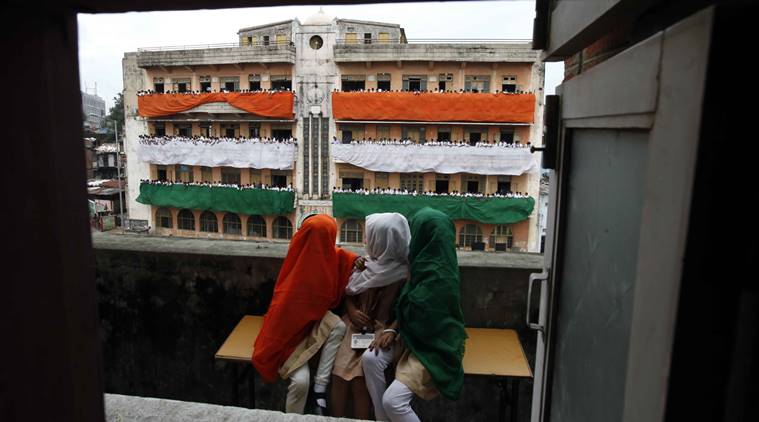Your native land, your life: A personal journey
What does it mean to serve your country? Is it to serve the establishment or to question it?
 A whole new world: Students look at their school being decked up in the colours of the flag on the eve of Independence Day in Ahmedabad in 2013. (Express Photo by Javed Raja)
A whole new world: Students look at their school being decked up in the colours of the flag on the eve of Independence Day in Ahmedabad in 2013. (Express Photo by Javed Raja)
In my neighborhood park last week, an old man sat with his tape recorder, his eyes closed, as if in meditation, while his outdated cassette player played Kavi Pradeep and Lata Mangeshkar’s Ae mere watan ke logon in the morning jogging-hour. Probably, this was his way of dealing with the hysterical news on TV over the last few days — by reaching out to fellow Indians and hoping to change some hearts.
The raging debates about JNU have reminded me of my coming-of-age journey with respect to the symbols of patriotism and a constant urge to display them. As a nine-year old studying in Kendriya Vidyalaya, Indian Military Academy (IMA), Dehradun, I remember feeling inferior because I was one of those rare kids in class whose father was a civilian. He was a plain-clothes engineer in Military Engineering Services and that, in my head, made me a lesser patriot as compared to my classmates, who were the children of lance naiks, subedars, and majors in the army.
But I always had other ways to show off my valour — like singing the national anthem aloud with full shiddat, all through my school life. When other children would mumble or sleep through the rendition, I would belt it out in full saavdhaan. It was not until years later, when I moved to Bombay and met with the coercive state rule of playing the national anthem before every movie screening in theatres, that I began to lose the emotion I associated with it. (Now it’s just a chore, and sometimes an embarrassment too when upcoming TV shows or films use it as a branding opportunity.)
After school, I attempted becoming an army man via the National Defence Academy route. The day I cleared the written examination for the Services Selection Board (SSB) was a beautiful one. Holding that Ashok Stambh-stamped sarkaari letter, I felt just a step away from my redemption.
I enrolled for SSB coaching run by a retired Colonelsaab in his big bungalow in the middle of a residential part of Lucknow. He would make our batch of four climb the walls of his bungalow’s orderly quarters, much to the amusement of children playing cricket on the road. They teased me especially, because I was reasonably overweight and climbing that high wall made my face red, and my breathing laboured. But I knew I was doing it for my nation. Then (plot-twist!) Colonelsaab taught us not to appear “patriotic” in front of the interview board. “It’s a cliché and an obviously untrue reason for you to want to join the army,” he said. “Tell them the truth! ‘Secure job, adventurous lifestyle, chance to see your country’ or even, ‘I love Ray Ban glasses’. They value candid reasons over the ‘I want to serve my country’ type filmi bakwaas.” That broke my heart. Though I stuck to what Colonelsaab had taught us, it was a lie for me. In any case, SSB found me physically unfit for the uniform and my dream died there.
In the next few years of studying in an engineering college, being patriotic meant feeling happy or sad depending on the cricket season results. My birthday coincides with Republic Day and that remained an added source of pride. The big moment of shake-up appeared in my last year at college when India lost to Australia in the 2003 World Cup final. I was devastated for days, as if somebody in the family had died. It took me a few more years to understand why I had felt personally humiliated then.
As I moved cities, chasing what I wanted to do in life (to be a writer), Bombay became my Vipassana ground. I was a freelancer, living in a one-room-kitchen in a huge city with zero friends. The world seemed bigger, the “nation” no more an abstract made up of simplistic symbols, but a huge mass of competing, diverse forces that somehow manage not to collide (most of the times).
One of my favourite visuals from my early years in Bombay was to see people reading newspapers of at least five different languages in every local train ride (the bigger pool being Gujarati, Hindi, English, Marathi, Urdu, Kannada, Tamil and Telugu). The cosmopolitan city had just started to unravel itself when the train blasts of 2006 happened. It was a rare day when I didn’t take the local, but the fear travelled underground, like aftershocks of a huge earthquake. A friend’s wife was injured, a man from our locality killed. I couldn’t bring myself to take the train for the next few days much like the rest of Bombay. The tragedy had the same calculus of scale as the Dawood-Memon blasts of 1993, but while the 1993 ones had felt like an attack on the nation, this one felt like an attack on me, the individual. The perceptive separation, between the idea of my country and the idea of me, had set in.
With no conscious affiliations to any ideology or ism, I started writing current affairs-based comedy for TV. The only thing shaping my world view at the time was a study of Hindi satirists ranging from Shrilal Shukla to Harishankar Parsai to Sharad Joshi to Ashok Chakradhar. Anti-establishment humour became a job as well as my personal philosophy.
Pointing out the flaws in our systems, speaking up against the powerful through humour started giving me the confidence I lacked as a child. It was during those years that I learned never to confuse the establishment/government for the nation. In fact, most of the times the two entities are at loggerheads with each other. I know journalism also believes in the same, but news media can still survive while reporting only good things, satire can’t. The establishment is not always the political alone, it can be any closed group that controls thought, starting from the smallest unit we all belong to — our families. I never acknowledged it at the time and it’s only in hindsight that I feel that the mildly self-righteous tone of satire helped me feel like a patriot again. I was no longer the civilian kid in the class who had no moral stake in this nation. In fact, I was the nation itself fighting the establishment one joke at a time.
This thought became the most liberating and self-sustaining course of action in the coming years. My aspirations, aesthetics, successes and insecurities became the properties of my nation. While cleaning up historical/tourist sites of plastic waste whenever I got a chance, I was not serving my nation but just myself. By not jumping traffic signals or by celebrating diversity or by fighting for internet freedom (first from UPA and now from NDA), I was not doing a favour to my generation but only to myself. Like aham brahmasmi (the core of my being is the ultimate reality), this was aham raashtrasami.
As cheesy as it sounds, it helped me understand my own feelings from a decade ago when India lost the WC final to Australia. At that time, the nation was just a collective noun for the egos and pride and immediate concerns of the people around me. That helped magnify the feelings of joy as well as failure on each occasion, but none of those feelings were entirely mine.
Nowadays, I feel something similar is happening on social media. Twitter and Facebook are the new institutions where an individual’s independent relationship with the nation is strictly prohibited and only a collective conscience decides who is a patriot. But then, I was also part of the same collective conscience for a long time and I am sure some of those traits remain, especially in cases of tragedies like the recent Chennai floods or achievements like ISRO’s Mars mission. It’s a personal journey that I can only hope more people get to make.
Which brings me to the important if hypothetical question of what song will play in a park to pep things up when I am old. Most likely, a happy Kishore Kumar song!
The writer is a stand-up comic, screenwriter and lyricist based in Mumbai.



- 01
- 02
- 03
- 04
- 05
























